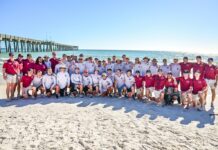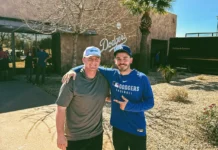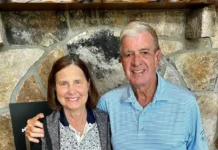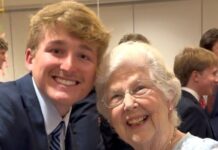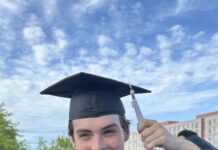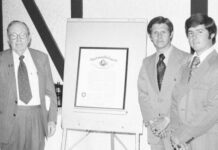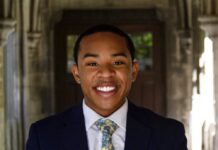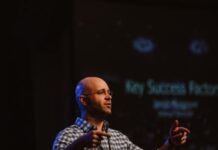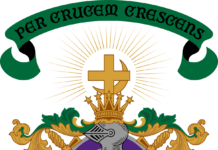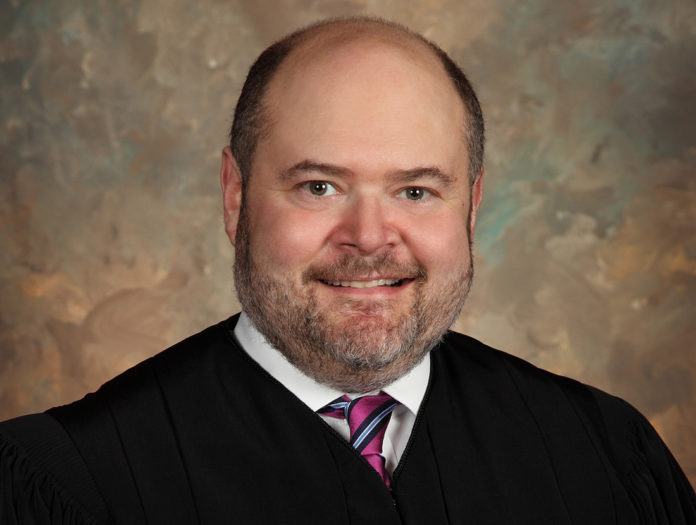After completing his college degree, Judge David Stras, Theta Chi Fraternity (Kansas 1995), continued at the University of Kansas and enrolled in a dual MbA/J.D. program. Following his completion of law school, Stras clerked at the U.S. Court of Appeals for the Ninth Circuit and at the U.S. Court of Appeals for the Fourth Circuit. After working one year at the office of Sidley Austin brown & Wood in Washington, D.C., he clerked for Justice Clarence Thomas of the United States Supreme Court. From 2004–2010, Stras was a professor of law at the University of Minnesota law School and received the Stanley V. Kinyon Tenure Track Teacher of the year Award in 2006. He was appointed to the Minnesota Supreme Court in 2010 and was elected to a six-year term in 2012. on January 31, 2018, Stras was sworn in as a Circuit Judge on the U.S. Court of Appeals for the Eighth Circuit after having been confirmed by the United States Senate. Judge Stras spoke with us shortly after moving into his temporary chambers in Minneapolis.
The Rattle: Tell us why you chose KU.
David Stras: One reason was my wife, Heather. We were high school sweethearts and she was a year ahead of me and had decided to go to KU and I decided to follow her. The second reason is that both of my parents went to KU and were active in fraternity and sorority life. They both had a wonderful time in college and thought it was a great place to go. I thought going to a public school was important and I also wanted to stay closer to home.
R: Why did you join Theta Chi?
DS: My dad was in Zeta Beta Tau at KU. I didn’t really know a lot about fraternities but I knew I wanted to at least take a look. I went through formal rush and looked at a dozen different fraternities and I really just sort of fell in love with Theta Chi from the beginning. I knew from my first meeting with the Theta Chi folks that it was the fraternity that was toward the top of my list. It was the people. I really got along well with my future fraternity brothers. I thought they were kind. They seemed to love the Fraternity and seemed to enjoy each other. I noticed these things in the first few visits with them. There were certainly some problems with the chapter house—the 1011 Missouri Street house was not in good shape. But you don’t join a fraternity for the physical structure; you join a fraternity for the friendship and for the brotherhood.
R: What was the chapter size while you were there?
DS: When I first joined it was probably around 50. By the time I graduated, it was probably 25–30. I hope that wasn’t a reflection on me or that I drove everybody away! (chuckles.) I was trying hard to expand the membership and found some good people, but we struggled because there were a lot of people who weren’t buying in. When you don’t have buy in it’s really hard to push the chapter in the right direction. You can’t just have one or two people doing the work while others are saying, “Well, we shouldn’t do this or shouldn’t try that.” That’s the challenge and when you’re outnumbered, that doesn’t help. After I left, the chapter was reorganized and membership increased and led to the chapter that we have today, which is a pretty good size and does pretty well.
R: What positions did you hold in the chapter?
DS: I sped through undergrad; I did it in three years. So year one, I was a pledge. Year two, I was Secretary. Year three, I was Chapter President. After finishing as President and through my first year of law school, I was vice president for fraternity affairs for the Interfraternity Council (IFC).
R: Did you live in the chapter house?
DS: I lived a majority of the time in the chapter house. I lived in the chapter house my first year and my third year. I also lived in the chapter house during the summer between my third year and my first year of law school. The housing board trusted me since I had just been Chapter President, so they allowed me to stay and I watched over the house that summer.
R: What’s the most important lesson you learned as Chapter President?
DS: It’s the importance of people. You can have great ideas and some not-so-great ideas. But in any organization, and this is particularly true in a fraternity where it’s really a democracy, even if you have a vision, you have to get the people around you to buy into it and to help you with that vision. You’ve got to be able to delegate to them. You’ve got to have that core of people who can help implement that vision and take the chapter to the next level. I don’t think I knew or appreciated that when I stepped into that position. I thought I could do a lot of the stuff myself or with the help of the chapter executive board. I underestimated the extent to which it was necessary to share the vision and to get buy in on the vision from everyone and how important it was for the people in the chapter to really love the Fraternity and want it to turn around and get it to the next level. I learned that you have to be able to trust others to get stuff done. You have to make them part of the team and you have to make sure that you make them feel valued as well.
R: What moment were you most proud to be a Theta Chi?
DS: My Pledge Dad, Rob Nye (1995), and I were actually set to graduate together since I finished undergrad in three years. On graduation day, all of us were waiting at the chapter house for Rob and he didn’t come. We waited as long as we possibly could and we didn’t know where he was. We went to graduation because we needed to be there and our families were expecting us. I remember coming back and we all asked, ‘Did anyone see Rob?’ Still, nobody knew where Rob was.
About 30 minutes after graduation was over, Danny Kaiser (Alpha Mu/Iowa State 1976),
who was KU’s assistant dean of students, came to the house. He said, ‘I’ve got some bad news. I didn’t want to tell you beforehand because I wanted you to experience graduation and not be too upset. Rob Nye passed away. He had some sort of diabetic reaction. His parents found him today.’
Danny told us, ‘We’re going to open up all of the resources of the university and I’m going to make sure that all the resources of the Fraternity are available to you as we go through this grieving process. I want you to know that I’ll personally be available to you. I know this is extremely hard. I also know that somebody else could have told you this but I felt it was really important for me to come out here as a fellow Theta Chi and let you know.’
That’s something I’ll never forget. It was a tough day. It took a happy occasion and put a very somber note on it. At the same time, it was amazing how all of us banded together. I was very, very proud of the way we handled that situation, the way we responded to Rob’s family, and the way we mutually supported each other. That was by far the hardest moment I had during college. There is a Rob Nye scholarship that the chapter gives out in his memory and I think that’s a great example of what Theta Chi and brotherhood can mean.
R: Tell us why you decided to go to law school.
DS: I always thought I wanted to be a lawyer though I didn’t quite know what lawyers actually did. My exposure to lawyers was black-and-white reruns of Perry Mason and he was really good at getting the witness on the stand to confess to committing the crime. It was really neat how he had such skill with language and interacting with people that he could get even the most hardened criminals to confess. I didn’t really have lawyers in my family, so it really was that it looked interesting to me. I also did debate in high school, which is a common activity that many future lawyers seem to do during high school or college.
R: What’s your advice to collegians or even alumni about going to law school?
DS: My advice is different than it would have been five or ten years ago, when I would have said think twice because we had a market that really was inundated with lawyers. More people were going to law school than the number of jobs available. People realized that during the latter part of the last decade and law school admission numbers went down quite sharply.
I think it is different now and that it has actually switched cyclically to the other side. Some law school classes are about 60–70 percent of what they were in terms of size and a lot of baby boomers are going to be retiring over the next decade or two. I think that right now, over the next five to 10 years, there are going to be a number of openings and jobs available. I think we are in an entirely different environment than we were six or seven years ago. The market has started to respond because law school admissions numbers have gone up sharply this year. So my advice would be if you’ve always thought you wanted to be a lawyer and you’re willing to put in the hard work that it’s going to take, you should do it.
R: What are some of your favorite memories as a law professor?
DS: One of my favorite stories as a law professor was my first day teaching while I was at the University of Alabama on a fellowship. First days are always difficult in any new job. I remember standing outside the room where I was going to teach thinking to myself, “Is this the time when they’re going to figure out that I’m a complete fraud and that I have no business teaching here?” I was about to turn the handle to walk into the class and I couldn’t do it. I stepped back and went around the corner into the bathroom and threw some water on my face.
Actually, something similar happened on my first day on the Minnesota Supreme Court. I remember reaching to press a button to turn my microphone on before my very first question and my hand was shaking. Those same kinds of thoughts were going through my mind: “Is this the time that all my colleagues are going to figure out that I’m a fraud and I shouldn’t be here?” Was I going to ask a question so stupid that everyone’s going to turn and laugh at me in the middle of court?
I loved teaching and I enjoyed being around the students and watching them grow up in the early stages of the profession before my very eyes. I always loved those moments where somebody said something that really resonated or really taught me something!
Another favorite moment is when I see my students do great things. Some of them eventually became partners in law firms and many of them did clerkships for judges. I became the chair of the clerkship committee at the University of Minnesota, so I saw some students go on to clerk for circuit judges and U.S. Supreme Court justices.
R: What do you consider to be the most important quality for a judge?
DS: I think it’s the ability to put aside your own biases. It’s not necessarily biases in the traditional sense like discriminating against somebody. What I’m talking about are personal experiences you’ve had throughout your life that may be similar to what the parties are going through or the type of claim being asserted. It could be experiences you had as a practicing attorney in similar cases. It could be experiences you’ve had in your personal life. It could be experiences family members have had that you know about. One of the things you have to do as a judge is that you can’t think about the experiences you’ve had or the experiences other people have had. You can use the experiences to have a better understanding of the case or what these people have gone through, but you can’t let that sway your decision making. You have to put your own experiences aside and decide the case based on what the law requires. You can’t impose your own personal policy preferences on a particular case that you’re deciding. That’s hard because you have to be conscious of what those biases may be and you have to have the ability to set them aside. Some judges fail at putting aside their own biases because they never understand or accept what their own biases are and, if you don’t know what your biases
are, you can’t put them aside.
R: How are the justices on a state supreme court like a fraternity?
DS: Well it’s a close knit group. I would say that that’s probably the biggest thing. Instead of a group of 20–80+ people all of the same gender, as in a fraternity or sorority, you have seven people (or nine in some states), not all of the same gender, not all of the same backgrounds. We don’t live together, thankfully! But we spend a lot of time together, so you need to be collegial with each other. You need to be cooperative. You need to be able to talk with them about confidential matters because all of our cases are confidential. In those ways, it’s just like being in a fraternity. You need to be collegial with the people you live with and the people in the chapter. You need to be able to trust them with confidential matters. You need to be able to work together with them. You’re in very close quarters if you live in the house. There are some similarities and I certainly will say that some of those things that I learned in the Fraternity have helped me become a more effective judge in terms of the interpersonal aspects of the job.
R: How would you describe your leadership style?
DS: While my judicial philosophy really hasn’t changed, my leadership style has. I’m much more comfortable delegating now and empowering people than I was before. When I first took the bench, it took a while for clerks to gain my trust where I could give them really substantive tasks and trust them to get it done the right way. I think they feel more empowered for having been given the trust and the responsibility that I now give them. A big part of it is also teamwork. You have to make everybody on the team feel valued or they’re not going to have the motivation to do their best work. If people feel like they’re trusted, valued, and empowered, I think that they will act as a team and work together.
R: How do you think Theta Chi prepared you for life on the bench?
DS: It taught me how to deal with people, how to treat other people with dignity and respect, and how to maneuver through difficult situations. When I was Chapter President, I had to make some difficult decisions for the good of the organization even though some members of the chapter didn’t agree with me. Even though they may not have been happy with my decisions, I know that I did the right thing. The Fraternity teaches responsibility, teamwork, and collegiality.
R: Why do you continue to come and speak at Theta Chi events?
DS: Because it’s the right thing to do. Theta Chi was good to me. I gained a lot from Theta Chi and I believe strongly in paying it forward. I think alumni can have a profound impact on collegians and I think that’s important. When I’m asked to do it and I have time to do it, I’m happy to do it and I enjoy it. The last time I spoke here at the University of Minnesota, it was great. I loved that format because a lot of people asked me questions and that was fun. Anything I can do to set a good example or to talk about my time that is helpful, I’m happy to do it.


